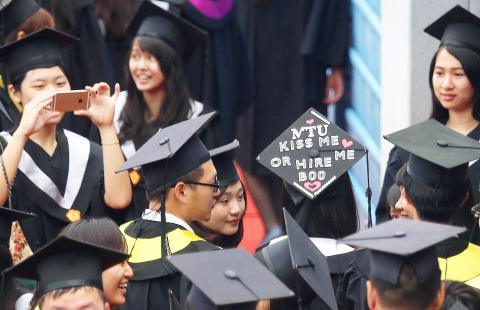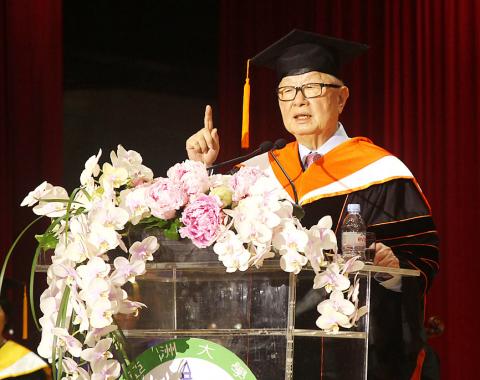Telling graduates that their character would determine their fate, Taiwan Semiconductor Manufacturing Co (TSMC) chairman Morris Chang (張忠謀) yesterday urged them to pursue lifelong learning and the “cultivated qualities” of honesty and caring.
Chang made the remarks in a speech in Taichung at the commencement ceremony of Asia University, which conferred an honorary doctorate of engineering on him, citing his contribution to the nation’s semiconductor manufacturing industry.
Chang said that he was 22 years old and “penniless” when he earned his master’s degree at the Massachusetts Institute of Technology.

Photo: CNA
However, he saw himself as a man of integrity who cared about society and who had cultivated his honesty and patriotism, he said.
Those qualities have had a positive lifelong impact on him and his career, Chang said, encouraging the graduates to nurture the qualities and to be incorruptible by resisting society’s temptations.
Chang decided — impulsively — to get a job after he was denied an opportunity to take part in a doctoral program, he said.

Photo provided by Asia University
The missed opportunity changed his views on learning, which he had considered just as a means to earn a degree, and motivated him to explore subjects that aided his career as well as those he found intriguing.
It led him to study even harder after work than when he was a student, he said, and urged the audience to pursue lifelong learning in a disciplined, systemic and organized manner.
It is necessary for people to strike a balance between time spent on work, pleasure and family life, as well as on learning, hobbies and rest, Chang said.
The best way to use the 168 hours in a week is to spend no more than 50 hours working and from 20 to 30 hours with family and friends and on your hobbies, Chang said.
Spend 10 to 20 hours learning and seven or eight hours exercising, while using what is left for rest, he said.
He added that the key of life is happiness that comes from a sense of accomplishment and gratification, not from fortune and fame.
In related news, according to a survey released by the online job bank yes123, Chang has been voted the ideal supervisor by college graduates, taking the title two years in a row.
He beat second-ranked Eslite Group chairman Robert Wu (吳清友) and Wowprime Corp’s (王品集團) Steve Day (戴勝益), whose ranking fell from second last year to fifth after his firm became embroiled in a host of food safety scandals.
Chang was the winner of the Global Exemplary Leadership Award by the Global Semiconductor Alliance in 1999 and was named “Businessperson of the Year” by Forbes Asia in 2012.
Additional reporting by Huang Pang-ping

The Chinese military has built landing bridge ships designed to expand its amphibious options for a potential assault on Taiwan, but their combat effectiveness is limited due to their high vulnerability, a defense expert said in an analysis published on Monday. Shen Ming-shih (沈明室), a research fellow at the Institute for National Defense and Security Research, said that the deployment of such vessels as part of the Chinese People’s Liberation Army (PLA) Navy’s East Sea Fleet signals a strong focus on Taiwan. However, the ships are highly vulnerable to precision strikes, which means they could be destroyed before they achieve their intended

The Taiwan Experience Education Program (TEEP) has funded short-term internships in Taiwan for more than 4,500 young people from more than 40 countries since 2015, with the goal of attracting and retaining international talent, the Ministry of Education said yesterday. Fifty-five colleges launched 514 projects this year, including in fields such as semiconductors, artificial intelligence, medicine and biotechnology, green energy, and sustainability, it said. The program provides research and practical internships in Taiwan for two to six months, and offers cultural exchange and networking opportunities, the ministry said. For example, National Formosa University’s Embedded System and Autopilot Laboratory developed two solar-powered drones in

GLOBAL: Although Matsu has limited capacity for large numbers of domestic tourists, it would be a great high-end destination for international travelers, an official said Lienchiang County’s (Matsu) unique landscape and Cold War history give it great potential to be marketed as a destination for international travelers, Tourism Administration Director General Chen Yu-hsiu (陳玉秀) said at the weekend. Tourism officials traveled to the outlying island for the Matsu Biennial, an art festival that started on Friday to celebrate Matsu’s culture, history and landscape. Travelers to Matsu, which lies about 190km northwest of Taipei, must fly or take the state-run New Taima passenger ship. However, flights are often canceled during fog season from April to June. Chen spoke about her vision to promote Matsu as a tourist attraction in

Taipei resident Mu Chu-hua caught some glimpses of China’s mighty military parade on YouTube on Wednesday. As she watched hypersonic missiles roll down Beijing’s Changan Avenue and troops march in lockstep, she did not feel like they posed a threat to Taiwan. Mu, a 69-year-old retiree, said she saw the parade as simply a way for Chinese President Xi Jinping (習近平) to “say thank you to the troops.” “I thought it was quite normal,” she said. “It was very cool.” China’s military parade commemorating the end of World War II was being watched internationally for insights into Beijing’s military advances and its show